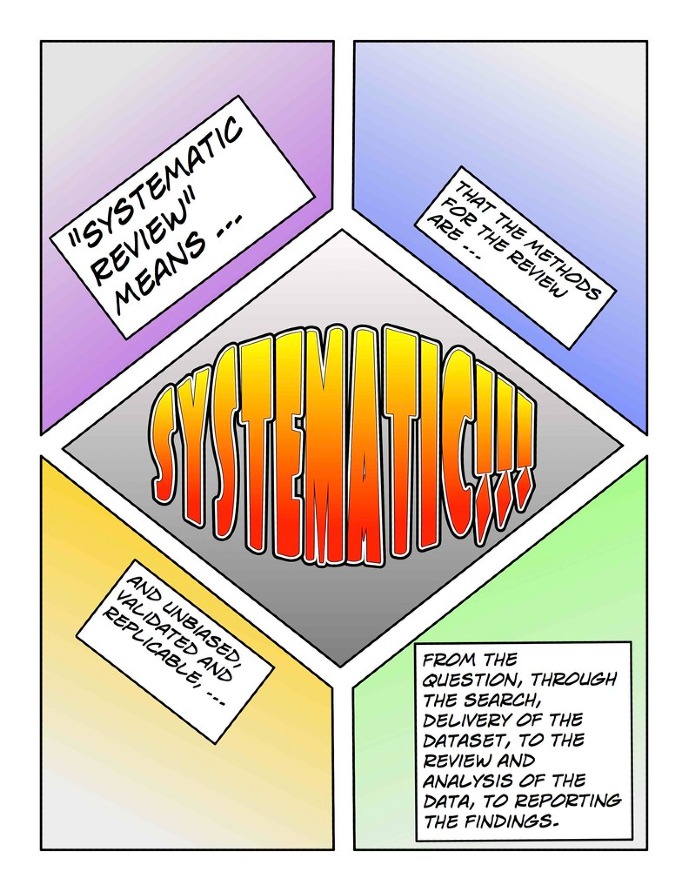Meet Ina Vrolijk, systematic review specialist

How do you conduct a systematic review? What requirements must a systematic review meet? What types of reviews are there? The University of Groningen Library (UB) offers support in searching for literature for a systematic review. Meet Ina Vrolijk, academic information specialist at the UB.
"We information specialists have the knowledge and expertise how bibliographic databases work and advise how best to build your search string to find literature.”
What is a systematic review? What distinguishes it from other types of literature reviews?
A systematic review is the most complete form of literature review and aims to provide an objective summary of all publications to date that are relevant to answering a specific research question.
Basically, you go through the same steps as in ordinary literature reviews. The difference is in the depth and care with which you perform each step. The goal is to find everything about the topic. To do that, you have to search very accurately in the appropriate bibliographic databases. Therefore, an important part of the search process is determining the right and all relevant search terms.
"The literature search must be replicable."
What are challenges in searching for literature for a systematic review?
Searches can yield very large numbers of results. I am often asked how many results is usual. This is related to the scope of the search query and numbers of studies on the topic as well as available time and manpower. In a systematic review, you want to provide a complete overview of the available literature on a topic. In other words, you don't want to miss anything. At the same time, you do not want to make the search string so wide that you find a lot of irrelevant literature. Balancing this is often difficult.
Another important point is that the literature search must be replicable. This places high demands on the search string and the reporting. Choices made must be transparently recorded and justified.

How do you support researchers in this?
As information specialists, my colleagues and I have the knowledge and expertise of how these bibliographic databases work and advise how best to build your search string to find literature. We offer support through our Library Guide on systematic reviews. In addition, researchers can make an appointment with us to discuss their search strategy.
We help optimize the search string and advise which bibliographic databases fit the research question. Furthermore, we can find out why certain articles are not found with a search string and help translate a search string to another database. We can also help with questions about citation management, deduplication of found hits and reporting guidelines. The researcher ultimately determines the final search terms and conducts the literature search.
"In our Library Guide, we provide an overview of different standards and guidelines."
Do you have any tips for researchers who want to do a systematic review?
It is important to be well aware of what type of review you want to do. In addition to a systematic review, in which a specific research question is answered according to a set protocol, many researchers opt for a scoping review. A scoping review involves surveying the available literature on a particular topic.
If you already know which journal you want to publish in, you can check what the protocol and reporting requirements are. If that is not already known, you can use a standard guideline such as PRISMA. In our Library Guide, we provide an overview of different standards and guidelines.
We receive many requests for support. Therefore, please contact us at an early stage to make an appointment so that we can reserve enough time to help you.
| Last modified: | 20 December 2024 2.58 p.m. |
More news
-
24 March 2025
UG 28th in World's Most International Universities 2025 rankings
The University of Groningen has been ranked 28th in the World's Most International Universities 2025 by Times Higher Education. With this, the UG leaves behind institutions such as MIT and Harvard. The 28th place marks an increase of five places: in...
-
05 March 2025
Women in Science
The UG celebrates International Women’s Day with a special photo series: Women in Science.
-
16 December 2024
Jouke de Vries: ‘The University will have to be flexible’
2024 was a festive year for the University of Groningen. In this podcast, Jouke de Vries, the chair of the Executive Board, looks back.

